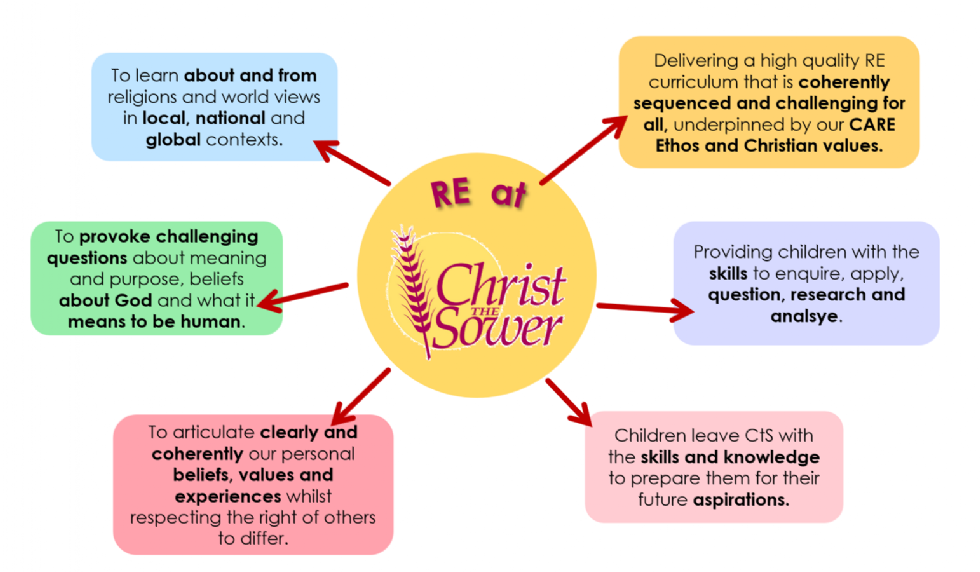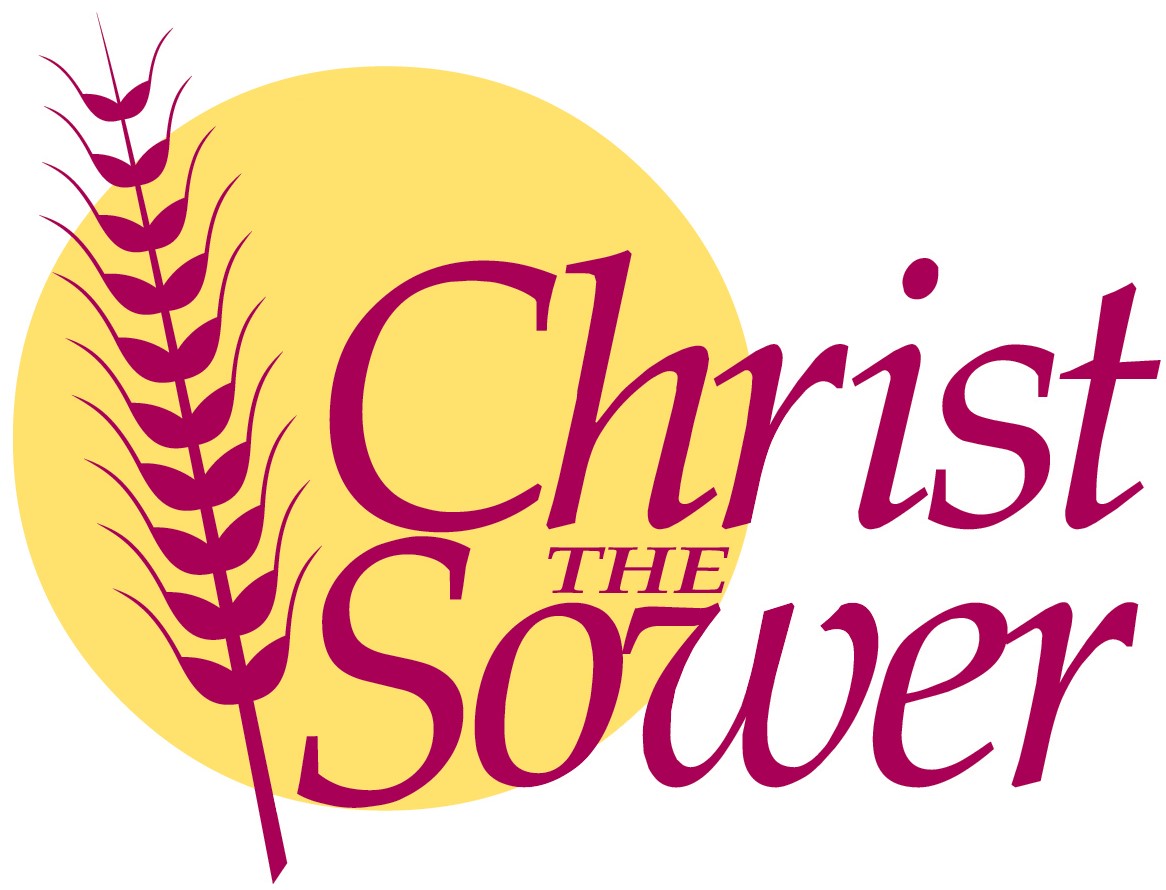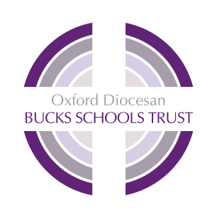RE
 Intent
Intent
At Christ the Sower we believe that Religious Education plays a central role in the spiritual, moral, cultural, academic and physical development of our pupils. As a school with a religious character we aim to contribute educationally to the development of our pupils as individuals and members of the society in which they live, by fostering a reflective approach to life in the context of a growing understanding of the experiences, attitudes, beliefs and religious practices.
The children will be encouraged to:
- Gain a thorough knowledge of Christianity
- Develop their own personal beliefs and values through their spiritual, moral, social and cultural development
- Understand from and learn about different religions and faiths, essential if they are to develop a respect and tolerance of other faiths.
At Christ the Sower our scheme of work is based on the Milton Keynes Agreed Syllabus and planning by the Oxford Diocese Board of Education. Teachers also draw knowledge from the Understanding Christianity material.
We aim to develop the children’s skills of enquiry, expression, empathy and reasoning. The main focus is Christianity with Hinduism, Judaism and Islam being studied thematically in Years 2 to 6. Infant children will experience stories from these faiths.
Our approach is through distinctive Religious Education led topics, which allow:
- Specific teaching about religious practices.
- Opportunity for children to explore moral issues, questions about self, relationships and the world around us.
Pupils are encouraged to:
- Develop a coherent understanding of each faith studied and recognise its distinctive features.
- Identify ideas and practices which are shared by religions.
- Reflect upon their and others’ experience so as to become aware of the spiritual dimension of life.
In teaching Religious Education, use of the following should be made:
1. Children’s experience, books, artefacts, videos, music, drama, visits to places of worship and visitors from people from other faiths.
2. The Christian year will also form a framework.
There will be an important link between Religious Education and Collective Worship.
Implementation
The scheme of work for Christ the Sower School has been developed to incorporate the Milton Keynes Agreed Syllabus 2017 – 2022
We have adopted an enquiry-based approach, beginning with the children’s own knowledge and experience before moving into learning about and from religion. We provoke challenging questions that will develop pupil’s knowledge and understanding of Christianity and other principal religions in Great Britain, fostering personal reflection and spiritual development. We aim to encourage children to explore their own beliefs (religious and non-religious) in the light of what they learn, as they examine how faith impacts individuals and society. Through the topics chosen we teach a respect for others, including those with different faiths or none, challenging prejudice and encouraging empathy, generosity and compassion. Within class discussions we encourage inclusive, informed and positive attitudes enabling pupils to live as responsible citizens in a diverse society. Ultimately we want to enable pupils to build their sense of identity and belonging, which will help them flourish within our Christian community.
A variety of resources, styles, and techniques will be used as appropriate to enable all children to make progress in RE regardless of their starting points, ability or background. Provision for children with Special Educational Needs and those children who are gifted and talented will be addressed through the planning process. Teachers differentiate tasks in RE as in all subjects.
Our planning is led by key questions which have been grouped around three main strands of learning about religion Believing - What do people believe about God, people and the natural world? Who am I? How and why are some stories and books sacred and important in religion? How do people’s beliefs about God, the world and others impact on their lives? Behaving - What can people learn from religious leaders and teachers? How do religious families and communities practise their faith, and what contributions do they make to local life? Belonging - What does it mean to belong? How and why are religious celebrations important to people? How and why do symbols express religious meaning? What do people believe about life after death and how are these beliefs reflected in the ways in which they mark death?
Teachers need to ensure they cover each strand (believing, behaving and belonging) by addressing all the key questions in a study of Christianity and some of the questions for the other core religions. The focus in Key Stage 1 should be on Christianity and Judaism, but referring to other faiths where appropriate, particularly if there are members of other faiths in the class. In Key Stage 2, Christianity should again be the main faith taught in each year group, alongside Hinduism and Islam, but where appropriate, opportunity should be taken to refer back to the faiths and topics covered in KS1. Progression in the scheme is shown by a variety of key questions, which change in context depending upon the age and knowledge of the children, thus developing their moral and spiritual awareness. This progression can be seen by looking at the plans in all year groups.
Early Years Syllabus
RE is not a statutory requirement at EYFS but best practice ensures that a variety of religious experiences and concepts should be covered, particularly under the Early Learning Goals relating to Understanding the World. These goals ask children to talk about past and present events in their own lives and in the lives of family members. They need to know that other children don’t always enjoy the same things, and are sensitive to this. They know about similarities and differences between themselves and others, and among families, communities and traditions. Some of these relate easily to religious and cultural practices such as festivals and observance. Stories from religious traditions provide a rich literary and cultural heritage and provide them with a range of experiences and emotions. Encountering the diversity of faiths and beliefs within their community at this early age raises awareness of the diverse world around them and prepares them for future learning.
Impact
Assessment for learning is an essential part of the everyday teaching and learning in RE and will be continual. It will take place through class work and discussion and will be recorded by identifying children working at the expected level for their age and those working below or at greater depth. In both Key Stages the children will be assessed by observation, book scrutinise and questioning. We will use the assessment materials from the ODBE to record progress and attainment. The RE coordinator monitors the teaching of RE throughout the school, gathering samples of work to ensure progression and coverage. Lessons are observed in order to maintain a high quality of teaching and learning. There is a dedicated section for RE on the annual reports to parents.
Curriculum Monitoring
The RE Leader reviews the planning completed by each year group to:
- Check coverage to ensure all requirements of the Agreed Syllabus are adequately met.
- Identify any gaps or unnecessary repetition
- Ensure that appropriate resources are identified and, where necessary acquired
- Review work completed by pupils to monitor standards throughout the school. 4 Lesson observations by the SLT and, where possible, the RE Leader take place to monitor the quality of teaching and learning.

